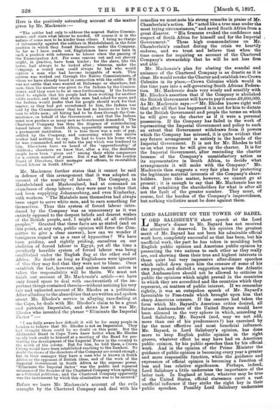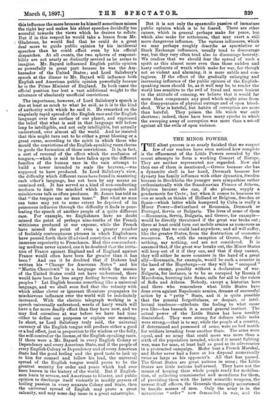LORD SALISBURY ON THE TOWER OF BABEL. L ORD SALISBURY'S short
speech at the Lord Mayor's dinner to Mr. Bayard has not received the attention it deserved. In his opinion the greatest merit of Mr. Bayard has not been his admirable official work here, completely successful as that has been, but his unofficial work, the part he has taken in moulding both English public opinion and American public opinion by presenting the two nations to each other as they really are, and showing them their true and highest interests in those quiet but very impressive after-dinner speeches which called down upon him the censure of some of his own people, and elicited a suggestion across the Atlantic that Ambassadors should not be allowed to criticise in public the opinions which might prevail in the countries to which they are accredited and the countries which they represent, on matters of public interest. If we remember rightly, it was an outspoken speech of Mr. Bayard's favourable to Free-trade which brought upon him that sharp American censure. If the censure had taken the form which Mr. Bayard's American critics desired, all future Ambassadors of the United States would have been silenced in the very sphere in which, according to Lord Salisbury, Mr. Bayard (and, may we not add, more than one of his predecessors ?) has exercised by far the most effective and most beneficial influence. Mr. Bayard, in Lord Salisbury's opinion, has done more to keep English public opinion in the right groove, whatever effect he may have had on American public opinion, by his public speeches than by his official work. And in the opinion of the Prime Minister the guidance of public opinion is becoming every year a greater and more responsible function, while the guidance and expression of official opinion is becoming a function of less and less relative significance. Perhaps, indeed, Lord Salisbury a. little underrates the importance of the latter task. In England at least, whatever may be true of the United States, official statesmen exert a vast unofficial influence if they strike the right key in their public speeches. Possibly Lord Salisbury underrates this influence the more because he himself sometimes misses the right key and makes his ablest speeches decidedly too scornful towards the views which he desires to refute. But if in this respect he would take a lesson from Mr. Gladstone, he would find that he could do a great deal more to guide public opinion by his incidental speeches than he could effect even by his official despatches. At all events, the two spheres of responsi- bility are not nearly so distinctly severed as he seems to imagine. Mr. Bayard influenced English public opinion so powerfully in great part because he was the Am- bassador of the United States ; and Lord Salisbury's speech at the dinner to Mr. Bayard will influence both English and American public opinion powerfully because he is the Prime Minister of England. In both cases the official position has lent a vast additional weight to the utterance of absolutely unofficial convictions.
The importance, however, of Lord Salisbury's speech is due at least as much to what he said, as it is to the kind of authority with which he said it. He remarked on the singularly rapid spread of the English race and the English language over the surface of our planet, and expressed the belief that what is said in that language will before long be intelligible, and not only intelligible, but actually understood, over almost all the world. And he insisted that this might turn out to be either a great blessing or a great curse, according to the spirit in which those who mould the convictions of the English-speaking races choose to guide the formation of those convictions. It is, in fact, a sort of reversal of the effect which the confusion of tongues,—which is said to have fallen upon the different families of the human race in the vain attempt to build a tower intended to scale the heavens,—was supposed to have produced. In Lord Salisbury's view, the difficulty which different races have found in mastering each other's language, has not been by any means an unmixed evil. It has served as a kind of non-conducting medium to limit the mischief which irresponsible and mischievous talk so often produces. St. James has told us that " the tongue can no man tame." But what no man can tame may yet to some extent be deprived of its poisonous influence through the difficulty it finds in pene- trating the speech of another people of a quite different race. For example, we Englishmen have no doubt missed the point of perhaps nine-tenths of the French witticisms produced at our expense, while the French have missed the point of even a greater number of foolishly contemptuous phrases in which Englishmen have poured forth their ill-advised conviction of their own immense superiority to Frenchmen. Had this non-conduct- ing medium never existed, can it be doubted that the irrita- tion of France against England and of England against France would often have been far greater than it has been ? And can it be doubted that if Dickens had written his " Change for American Notes " and his "Martin Chuzzlewit" in a language which the masses of the United States could not have understood, there would have been far less angry feeling between the two peoples ? Let English become something like a universal language, and we shall soon find that the velocity with which either clever or ignorant ill-nature propagates its mischievous influence over the world will be indefinitely increased. With the electric telegraph working in a speech universally understood, words of hasty wrath will have a far more deadly effect than they have now, and we may find ourselves at war before we have had time either to define our purposes or explain our meaning. In short, as Lord Salisbury truly said, the universal currency of the English tongue will produce either a good or a bad effect, just in proportion to the wisdom or the folly, the self-control or the license, of the English-speaking races. If there were a Mr. Bayard in every English Colony or Dependency and every American State, and if the people of every English Colony or Dependency and of every American State had the good feeling and the good taste to look up to him for counsel and follow his lead, the universal spread of the English tongue would prove to be the greatest security for order and peace which had ever been known in the history of the world. But if English- men learn to scream, and Americans to bluster, and public opinion to discharge itself violently in muddy geysers of boiling passion in every separate Colony and State, then the universal spread of English may prove a great calamity, and may some day issue in a great catastrophe. But it is not only the spasmodic passion of immature public opinion which is to be feared. There are other causes, which in general perhaps make for peace, but which also make for rottenness, that may exert a still more dangerous influence. The various influences, which we may perhaps roughly describe as speculative or Stock Exchange influences, usually tend to discourage war, but they very often tend also to discourage honesty. We confess that we should fear the spread of such a spirit as this almost more even than those sudden and hasty outbursts of wrath which make for war, for though not so violent and alarming, it is more subtle and con- tagious. If the effect of the gradually enlarging and increasing influence of the public opinion of the English- speaking races should be, as it well may be, to render the world less sensitive to the evil of fraud and more lenient to the attitude of cunning, we believe that it would far more than compensate any good which might arise from the disappearance of physical outrage and of open blood- shed. War is hateful, but habits of corruption are more than hateful. They poison the life which war only shortens ; indeed, there have been many epochs in which the sweeping away of corruption was more than a. set-off against all the evils of open violence.







































 Previous page
Previous page